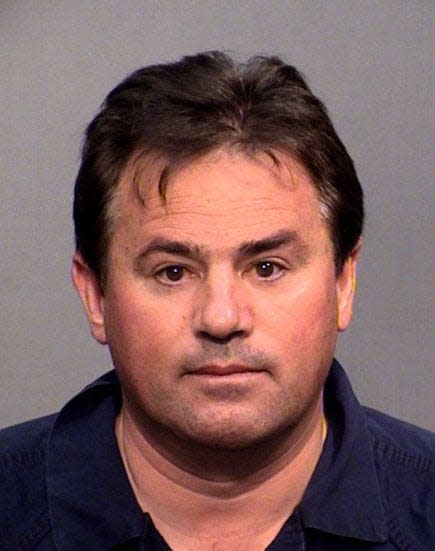Legal woes for Arizona polygamist sect leader deepen in Flagstaff court

Polygamist sect leader Samuel Bateman faces bigger legal hurdles after fresh information about a previously unreported child endangerment case was revealed in court late Friday,
Bateman sat in county jail and appeared via Zoom at Coconino County Superior Court in Flagstaff, as state prosecutors urged the judge to impose stiffer conditions on any release.
Judge Fanny Steinlage agreed, increasing his bond to $250,000 and forbidding Bateman any contact with the victims or minors.
Bateman has been in and out of jail since Aug. 28, when he was pulled over after Arizona Department of Public Safety troopers noticed he was towing three girls in a wooden horse trailer through Flagstaff. He bonded out a few days later and was rearrested on Sept. 13 by FBI agents. Federal prosecutors charged Bateman with destruction of evidence.
But towing young girls in a trailer was something he had done before, according to state prosecutors' courtroom claims during Friday's hearing.
Colorado City marshals cited Bateman with a misdemeanor, on Aug. 14, for doing just that, according to state prosecutor Jonathan Mosher.
This information was entered as part of the prosecution's attempt to raise the bar on Bateman’s release conditions, seeking a $500,000 bond and forbidding any contact with minors or the victims.
Adam Zickerman, the Flagstaff lawyer representing the 46-year-old Bateman, wanted to have the court throw out this motion because Bateman is already being held without bond in federal custody.
Mosher responded: “Now, look, I get it. Mr. Zickerman says, 'Well, why does it matter? The feds have him on a hold?' Well, the reason it matters to us is because we're not the feds.”
After Bateman’s arrest in August, the Flagstaff Justice Court set an original bond at $150,000, which had been paid out with the help of “friends and family” a few days after his arrest, according to Zickerman and court records.
The case for a bond increase
Mosher noted that in Bateman’s federal U.S. District Court case, Judge Camille Bible voiced concerns that Bateman had connections to a foreign country and had traveled abroad in the past three years.
Zickerman revealed that one was a business trip to Cancun, Mexico, where Bateman had real estate dealings, claiming that it isn’t a crime to travel.
He also held that the state’s motion to increase release conditions were out of line with what Bateman was being charged with. He also commented that his previous Aug. 14 citation represented religious persecution.
Zickerman quoted the script from that citation, "Yeah, we stopped this guy before with his wives."
“This is clearly some motive behind it, which is why we bring up the issue of, essentially, a form of persecution,” he said.
He also argued that the victims in the case were not cooperative and did not want to press charges. The identities of the girls, aged between 11 and 14, remain unclear, as do those of nine children taken into protective custody during the FBI's Colorado City raid. Nor is it clear if some, all, or none of the children are his.
In a written brief, Bateman’s defense had previously argued that a condition forcing Bateman not to have contact with the victims was uncalled for because he had a "tangential” relationship with them.
Mosher hung on that “tangential” description, saying that he “thought it was unusual phrasing in these circumstances.”
"Are we saying these people in that trailer are his daughters? Are his disciples? What's the tangential relationship?" he commented.
What you need to know: FLDS leader Samuel Bateman arrested in Arizona
Residents of Colorado City and its twin community of Hilldale, just over the Arizona-Utah state line, have said Bateman describes himself as a prophet and spiritual father in a splinter polygamist sect of the Fundamentalist Church of Latter Day Saints.
Mosher said that under Arizona law, a victim doesn’t need to be aware of the danger they are in for the state to make their case.
The FBI, in a search warrant affidavit obtained and reported by the Salt Lake Tribune, claimed agents were looking for computers, “lingerie-style underwear that could be worn by minors,” and any evidence that sources of income were used to facilitate travel for underage marriage or sexual relationships. The bureau also sought any “correspondence about Bateman’s adult followers marrying, having sexual relationships with, or similar” associations with minors, the Tribune reported.
Mosher pointed to the federal charges against Bateman, alleging that he destroyed evidence as reason for concern about the destruction of evidence in the state case.
Defense: Bateman is a religious leader
Zickerman argued that Bateman's position as a religious leader meant the state and government were overreaching their charges.
As an ordained minister, Bateman had privileged communication with his followers and had a right to protect his messages, defense lawyers told the court.
Mosher responded that just because Bateman was a religious leader didn't mean his phone was out of bounds.
“I believe we have a simple case. We're not trying to turn this into Colorado City genealogy, or Colorado City religion. There's one party that keeps bringing up religion in this case, and that's the defense.”
Mosher claimed the state must prove only “that loading three girls in a trailer with a bucket and a bag in it as a toilet and locking it from the outside on an 80-degree day in Flagstaff heading towards 100-degree day down in the Valley, and towing them at highway speeds in that trailer, when just two weeks before you were warned of the fact that — that presents a serious risk.”
Bateman's next hearing will be announced after his lawyer has a chance to discuss it with him.
This article originally appeared on Arizona Republic: Legal woes deepen for Arizona polygamist sect leader Samuel Bateman
